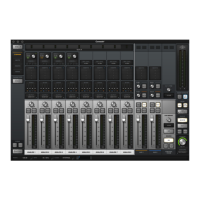Apollo Thunderbolt Software Manual Multi-Unit Cascading 195
Multi-Unit Cascading
Apollo Expanded Overview
Note: On Windows PC systems, multi-unit cascading is not yet available. Visit
help.uaudio.com for the latest information.
Up to four Apollo Thunderbolt units of any model type (Apollo/Apollo 16 with
Thunderbolt Option Card, Apollo 8, Apollo 8p, Apollo 16, Apollo 16 MkII, Apollo Twin)
can be connected and used together as a single consolidated multi-unit system via
Thunderbolt. When multiple Apollo units are connected via Thunderbolt, all units are
controlled within a single Console window, and the I/O complement of all devices are
available within the DAW. Operating a multi-unit system is nearly identical to that of a
single-unit system for seamless expansion when more I/O is needed.
Note: A total of six UAD devices can be used together in a single system.
Console Integration
When multi-unit cascading, the number of Console inputs is increased to match the
increased hardware inputs. Both units share the same monitor, auxiliary, and cue mix
buses for integrated mixing convenience.
Monitor and Expander Units
To facilitate the mix bus integration within Console, one unit must be designated as the
monitor (master) unit. Monitor speakers and cue outputs are attached to the monitor unit
only. All other units are expander (slave) units. For details, see Monitor Unit Designation.
Tip: Headphone outputs can be freely assigned to any master or slave unit.
Hardware Setup
In multi-unit systems, all Apollo devices are interconnected via a single Thunderbolt
cable per unit, with a single Thunderbolt connection to the host computer. The host
computer port, as well as any Thunderbolt devices on the bus (including Apollo), can be
Thunderbolt 1 or Thunderbolt 2.
Constraints
Depending on the specific configuration, certain features and/or I/O streams are reduced
when multi-unit cascading. See Multi-Unit Constraints for details.
Driver I/O
Apollo I/O availability and numbering changes when multi-unit cascading. I/O routes can
be virtually remapped via Apollo’s I/O Matrix Panel. For a list of default I/O states, see
the Driver I/O Tables.

